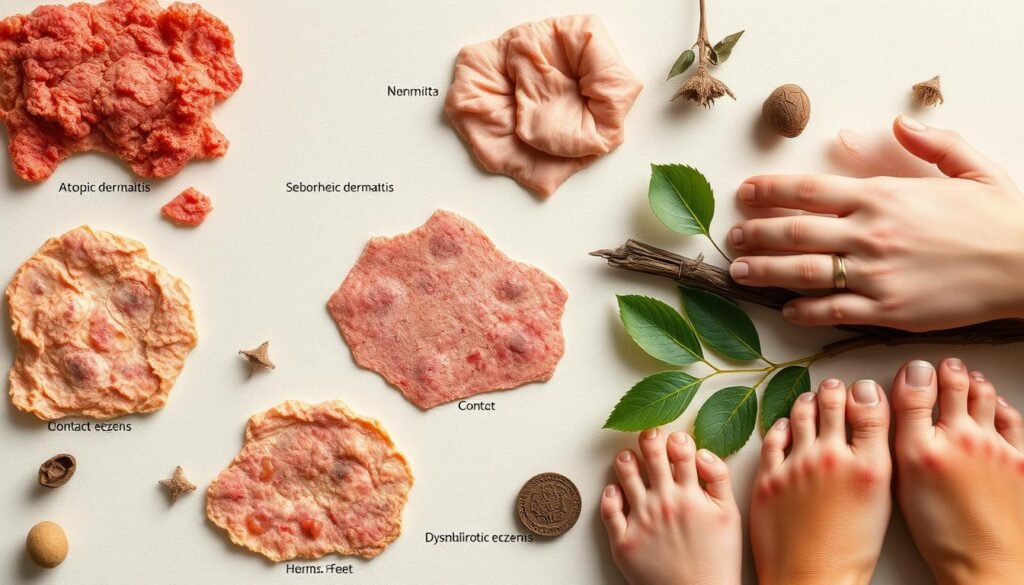About 30% of people in the United States will face eczema in their lifetime. This skin issue causes constant itchiness and redness. It affects many lives deeply. Yet, no sure cure exists, but there are ways to manage its symptoms. Our guide will help you understand eczema better, look at treatments, and offer hope for those searching for permanent solutions.
Key Takeaways
- Eczema affects about 30% of the U.S. population at some point in their lives.
- There is currently no cure for eczema, but effective treatments exist.
- Integrated approaches to eczema treatment show promising results.
- Alternative remedies, including coconut oil and probiotics, have gained popularity.
- Managing triggers is crucial for reducing flare-ups and enhancing skin health.
- Developing a tailored skincare routine can support ongoing management of eczema.
Understanding Eczema: An Overview
Eczema refers to chronic skin issues affecting over 31 million Americans. It greatly impacts life quality. The most common form, atopic dermatitis, impacts millions.
It affects 9.6 million kids and 16.5 million adults in the U.S. Despite not being contagious, it causes discomfort. This is due to a weakened skin barrier and immune response.
Those with eczema face flare-ups caused by environmental allergens and genetics. It’s linked to allergies and asthma as well. People with atopic dermatitis are more prone to these conditions, forming the atopic triad.
Research shows Black Americans often suffer more severe eczema symptoms. Eczema comes in various forms like contact dermatitis and dyshidrotic eczema. Each reacts differently to specific triggers.
Contact dermatitis occurs upon exposure to irritants or allergens. Meanwhile, dyshidrotic eczema is more common in men.
Eczema shows different symptoms through different stages of life. It affects 10% to 20% of infants. Fortunately, most child cases improve with age, especially after five.
Symptom management varies by age, demanding customized treatment plans.
Common Symptoms and Types of Eczema
Eczema is common in people of all ages, showing symptoms like itchiness, dryness, redness, and scaliness. Some might also get blistering or thickened skin. Knowing these signs is key to manage eczema well.
There are different eczema types, each needing its own approach. The main ones are:
| Type of Eczema | Description | Common Symptoms |
|---|---|---|
| Atopic Dermatitis | The most common form, often starting in childhood. | Itchiness, dryness, redness, blistering |
| Contact Dermatitis | Triggered by contact with irritants or allergens. | Redness, swelling, irritation at the contact site |
| Dyshidrotic Eczema | Affects hands and feet, characterized by small blisters. | Itchiness, blisters on palms/soles, cracks |
| Seborrheic Dermatitis | Affects oily areas, often presenting with patches of scaly skin. | Flaking, red skin on scalp and face |
| Nummular Eczema | Manifests as circular patches on the skin. | Itchiness, round, coin-shaped spots |
Knowing eczema types helps pinpoint triggers, leading to better prevention. Common triggers include dry weather, irritants, allergens, and stress. It shows why tailored eczema management matters.
People with eczema should watch their symptoms and see doctors when needed. Starting treatment early, like using moisturizers and creams, can really help. It improves life quality.

How to Cure Eczema Permanently: Strategies and Lifestyle Changes
Finding a total cure for eczema might be tough, but there are great ways to manage it. Key steps include focusing on hydration, being gentle with your skin, and reducing stress. It’s vital to stick to a daily routine.
Mild, non-alkaline soaps and liquid detergents are kinder to your skin. Choose products without fragrances. Moisturizing twice a day is key for keeping your skin hydrated. Coconut oil and sunflower oil are helpful when used on wet skin. They fight itchiness and help your skin.
Oatmeal baths or apple cider vinegar can calm your skin. The clothes you wear matter too. Choose fabrics like cotton or silk to keep your skin happy and avoid flare-ups.
| Strategy | Description | Benefits |
|---|---|---|
| Mild Soaps | Use non-alkaline, fragrance-free soap products. | Minimizes skin irritation. |
| Moisturizing Routine | Apply lotion twice daily, especially on damp skin. | Enhances skin hydration and barrier function. |
| Bath Treatments | Incorporate oatmeal or apple cider vinegar in baths. | Soothes inflammation and itching. |
| Stress Management | Practice relaxation techniques such as meditation and yoga. | Helps alleviate eczema flare-ups triggered by stress. |
| Natural Remedies | Use coconut oil and sunflower oil on damp skin. | Provides hydration and antibacterial benefits. |
Techniques to reduce stress like meditation and yoga are crucial for managing eczema. Being active is good for your health and can reduce eczema problems. Eating foods rich in omega-3, vitamin D, and flavonoids is also helpful. Making these changes can greatly improve your life.

Effective Eczema Treatment Options Available
Finding the right eczema treatment is crucial for symptom management. There are many therapies to fit different skin types and severity levels. These range from simple over-the-counter remedies to prescription drugs. Understanding these options helps people choose the best treatment for their skin.
OTC Treatments for Immediate Relief
OTC eczema treatments provide fast relief. Some popular options include:
- Topical corticosteroids – These creams vary in strength and can reduce inflammation and itchiness effectively.
- Barrier repair moisturizers – Available both over-the-counter and by prescription, these moisturizers help to maintain hydration by locking moisture into the skin.
- Antihistamines – Useful in controlling itch caused by allergies, they can help improve comfort for individuals suffering from eczema-related disruptions.
Prescription Medications and Their Usage
For more severe cases, prescription medications offer additional help. Important treatments include:
- Topical calcineurin inhibitors – Medications like Protopic® (tacrolimus) help manage inflammation by inhibiting immune responses.
- Immunosuppressants – These are used for moderate to severe eczema, with careful monitoring due to potential side effects.
- Biologics – For moderate to severe eczema, treatments like Dupilumab and Tralokinumab are options. They target specific parts of the immune system but may have side effects like conjunctivitis.
Emerging Therapies and Clinical Trials
The search for new eczema treatments is ongoing. This includes:
- JAK inhibitors – Drugs like Abrocitinib and Upadacitinib target inflammation signals, offering hope for severe eczema management.
- Phototherapy – Using narrow-band UVB light can help reduce inflammation. It’s promising but needs careful monitoring to avoid skin damage.
- Alternative remedies – Natural treatments such as sunflower and coconut oil, and some vitamins, are explored for their soothing effects on eczema.
Natural Remedies for Eczema Relief
Many people with eczema explore natural remedies to ease their symptoms. They discover that home treatments and diet changes can make a big difference. It’s important to know these options for better skin care.
Home Remedies to Soothe Skin
Many home remedies can reduce eczema’s redness and swelling. Coconut oil, for example, keeps skin moist and lowers inflammation if used for eight weeks. A warm bath with vinegar is also helpful, especially with two cups of vinegar for 15 to 20 minutes, as recommended by the National Eczema Association.
- Colloidal oatmeal baths: These help soothe itching and irritation.
- Petroleum jelly: It’s a key part of skin care routines.
- Aloe vera: Offers cooling relief from inflammation and itch.
- Calendula: Aids in skin repair and fights germs.
- Tea tree oil: Its antiseptic properties calm inflamed skin.

The Role of Diet in Eczema Management
Your diet plays a big role in managing eczema. Foods that fight inflammation, like fatty fish, fruits, and veggies, are very helpful. It’s also smart to avoid sugary foods that can cause flare-ups. Learning about diet and eczema can help guide your food choices for better health.
Finding the right natural remedies for eczema is a personal journey. It involves trying different things to see what helps. Using home treatments along with eating well offers a balanced way to find relief. This approach focuses on caring for your body inside and out, fitting your own lifestyle and needs.
Developing an Eczema Skincare Routine
A good eczema skincare routine makes a big difference for skin health. It’s about finding the right products and methods. These steps help soothe symptoms and protect the skin.
Choosing the Right Products
Finding the right skincare products is key. Choose fragrance-free moisturizers and gentle cleansers. These should be gentle to avoid irritation. Pick ointments and creams with lots of oil. They moisturize and protect your skin. Stay away from ingredients like fragrances, urea, and retinoids. These can make sensitive skin worse. A routine that fits your needs can improve your skin.
Daily Moisturization Techniques
Keeping your skin moist is important. The National Eczema Association says to moisturize right after showers. This locks in moisture. Try to do this 2-3 times a day. Use the “soak and seal” method. Soak your skin, pat it dry, and then put on a thick moisturizer while damp. This helps keep your skin hydrated.
Bathing Practices for Sensitive Skin
How you bathe affects eczema skin. Bathe for 5 to 10 minutes each day. This keeps skin clean and prevents it from getting too dry. For kids, bathtime also means bonding time. Plus, it helps get rid of bacteria and dead skin. Always moisturize after bathing. This helps keep your skin from getting too dry and reduces flare-ups.
Eliminating Eczema Triggers
Learning how to identify and manage eczema triggers is key to control. It helps minimize flare-ups and boosts skin health. This part will cover common irritants to steer clear from and tips on identifying personal allergens.
Common Irritans to Avoid
To effectively manage eczema, knowing what irritants to avoid is crucial. Here’s a list of common triggers:
- Harsh chemicals in cleaners and detergents
- Wool or synthetic fabrics
- Fragranced or alcohol-based body care products
- Extreme temperatures and varying humidity
- Dust mites, pollen, and other environmental allergens
- Skin infections that worsen symptoms
- Nickel and different metals causing contact dermatitis
Identifying Personal Allergens
Finding out your specific allergens is essential if you have eczema. A detailed diary helps track what triggers your symptoms. Getting help from a doctor is also a good idea. Try these methods to find your triggers:
- Keep a food diary and note skin reactions to spot patterns.
- Get allergy tests to uncover hidden sensitivities.
- Notice if new products or environmental changes link to flare-ups.
- Talk to a dermatologist or allergist for tailored advice.
Preventing Eczema Flare-Ups
To manage eczema well, you need to be ahead of it. You must look at your daily habits and mental health. Focusing on stress control, regular exercise, and good sleep can lower flare-ups.
Stress Management Practices
Eczema can get worse with stress. Adding stress control into your daily life is key. Use mindfulness, yoga, and breathing exercises to ease stress.
Make time for fun or calming activities to stay peaceful. Watch your stress and get help if it’s too much. This can keep your skin healthy.
The Role of Exercise and Sleep
Working out is great for your body and mind. It keeps blood flowing and may stop eczema from getting worse. Try gentle activities like swimming, walking, or biking. These are good for your skin.
Getting enough sleep is also vital for your skin to heal. Try to sleep well every night. A steady sleep schedule helps with stress and fighting eczema.
Conclusion
Managing eczema takes understanding, care, and patience. Though no cure exists for atopic dermatitis and other eczema types, long-term solutions can help a lot. Knowing what triggers eczema and finding the best way to manage it are key steps.
To explore treatment options, making smart plans is crucial. These plans can ease symptoms and boost life quality. Taking care of your skin, avoiding irritants, and living healthy are vital for eczema care. It’s also important to talk openly with doctors. This way, treatments can be customized for better results.
Millions in the U.S. struggle with eczema, but the right knowledge and care can make a big difference. Commitment to proper eczema care can greatly improve skin health and life’s joy. With effort, people with eczema can find significant relief.